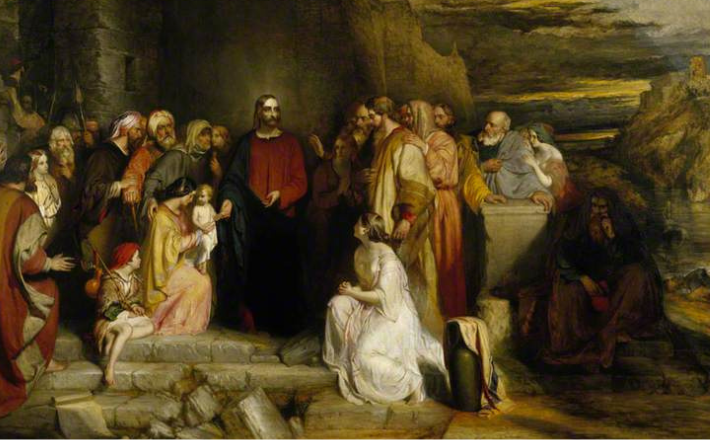Commentary on Micah 3:5-12
What would our lives be like without the prophetic word?¹ A life without vision: no joyful discernment of God’s purposes for ourselves, no gradually unfolding perception of the Holy Spirit at work for justice in our communities. It’s a grim prospect. We would struggle to eke out a bleak existence in the shadows of hopelessness with “no answer from God” (Micah 3:7). Confusion would cloud our efforts to pray about those things beyond our immediate sight. Human nature being what it is, we would become less motivated to seek the good.
Without the prophets’ words of rebuke and their insistent calls to return to the covenantal truths of Scripture, we would hoard what we have and fight those who press contrary claims. We would conveniently forget to remember the poor. A shallow theology of quid pro quo would reign, with rulers administering faux justice “for a bribe” and clergy teaching the faithful “for a price” (3:11).
Micah is outraged about false prophets–those seers-for-hire who assure the people of well-being and peace, so long as they receive the requisite financial compensation. False prophets not only rob people of the chance to repent, they underwrite a system of corruption that allows Israel’s spiritual and political leaders to continue wreaking havoc on the lives of those whom they should be serving. Abhorring justice, perverting equity, building Zion with blood–this is what the people of God can expect from their leaders when prophets do not tell the truth.
What is the most devastating result of all? Jerusalem will be destroyed. The place where God has caused the divine Name to dwell in the midst of God’s beloved people–holy Zion itself–will be “plowed as a field” and made “a heap of ruins” (3:12). Micah tells us that God’s very presence among God’s people is at stake.
Believers dare not take the prophetic word for granted. Hearing that word is never easy, though, because it holds us and our communities accountable. We would much rather hear words of “shalom.” Imagine a false prophet offering the annual report for your congregation:
- Certainly our church is doing all it can for the poor!
- Naturally, we strive to act with compassion in every aspect of our lives!
- Of course we give sacrificially to bring near the kingdom of God, rather than hoarding our wealth!
- God has nothing but fabulous blessings in store for us. Good work, everyone!
But our incarnational God knows the truth of our lives. We fall short daily, and we must repent if we are to be in honest relationship with God and one another. Therefore, God stirs up prophets to speak the truth to us–not to condemn us, but to invite us into more authentic discipleship and deeper love for others.
Congregations need to hear that the prophetic word is real and powerful. In our increasingly secular and narcissistic world, many have become jaded about the possibility of social change and the effectiveness of the Church’s witness. The radical force of biblical faith is not so obvious these days, especially to those who idolize worldly power, those who barely know the Bible, and those unfamiliar with the history of Christian witness. Here, Micah offers us three points that are excellent resources for preaching the Gospel.
First, Micah invites us to think about the desolation and darkness of a world without prophetic vision. Help your congregation to imagine what communal life would be like without Martin Luther King Jr.’s stirring use of Amos 5. Invite them to consider how impoverished our Eucharistic theologies would be without Jeremiah’s new covenant as a source for New Testament witnesses to Christ (Jeremiah 31:31-34; Luke 22:20; 1 Corinthians 11:25; Hebrews 8:6-13, 10:16-18). Spiritual discernment and social justice work would be positively anemic without the truth-telling of the prophets.
Prophecy is about candor and hope. Find creative ways to embolden your congregation to embrace candor and hope, two spiritual virtues that every believer needs in order to negotiate the challenges of twenty first century life.
Second, Micah offers himself as witness, not only for his own ancient community but for future generations who read the Book of Micah. “As for me,” Micah thunders, “I am filled with power, with the spirit of the LORD, and with justice and might, to declare to Jacob his transgression and to Israel his sin” (3:8). Because Micah loves his people, he will not allow them to continue in their prideful and destructive ways.
Are Micah’s words uncomfortable for us? Certainly–just as it is uncomfortable when loved ones carry out an intervention with an alcoholic, or when a therapist declines to play along with a client’s dysfunctional script. But without truth there can be no repentance and no transformation. Thus, Micah is an invaluable companion for individual believers and for every community that seeks to please God. It is good news indeed that Micah continues to walk with us.
Third, Micah invites us to engage Scripture as a richly multilayered resource to help us repent. Micah’s testimony in 3:12 is taken up by the mighty Jeremiah centuries later, precisely to underline the point that prophetic words of judgment are meant to catalyze repentance (Jeremiah 26:18). The goal of those shocking Old Testament oracles of judgment, which many believers today find so repellent, is to encourage repentance. The God of the prophets is a God of mercy who whispers, “I have no pleasure in the death of anyone. Turn, then, and live!” (Ezekiel 18:32).
Just as Jeremiah reflects on Micah, many Scripture texts elaborate on earlier witnesses, nuancing and reframing them for changing circumstances. Encountering this inner-biblical dialogue, we learn to treasure Scripture as a dynamic, living tradition. Every congregation invited into Scripture’s richness will find its spiritual life deepened, challenged and illuminated. Courage and compassion will blossom. Here is the truth we gain from Micah: love of God and neighbor will flourish in every community that dares to heed the prophetic word and repent.
Notes:
- Originally published on this site on November 2, 2008.



November 5, 2023